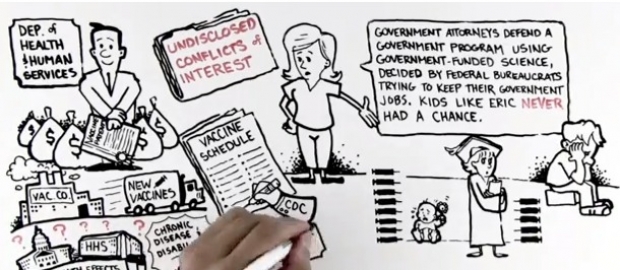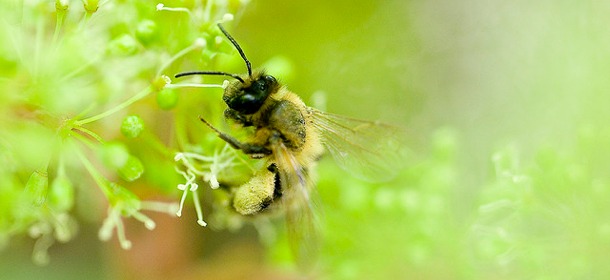Environment
Organic Food Is Not Discount Food
Organic food isn’t cheap, and the real thing never will be. The concept of mass-produced organics is fraudulent. It runs counter to both the ethos & reality. They cannot be produced by Agribusiness-style farmers who keep producing the same crop year-on-year. As long as food is treated as a commodity, then we have degraded the basic substance of our bodies and minds.

Farmers Market, by Paul Collins (cropped)
by Heidi Stevenson
On top of the recent horsemeat scandal, we now have human DNA found in meat produced by Agribusiness. Lest we forget, the horsemeat scandal started in exactly the same way. First, it was announced that traces of horsemeat DNA had been found in some beef products. Then, we heard about how it was actually more than DNA, but significant percentages. Finally, we learned that some “beef” products had no beef at all—they were 100% horsemeat!
Of course, we were informed that there was no need to worry about it. Government agencies assured us that it was perfectly safe.
Now, though, we’re learning that human DNA is being found in South African Agribusiness foods. Naturally, no one should worry … but it shouldn’t be surprising, because, after all, humans do cut meat up and … well, sometimes they injure themselves. That does, though, beg the question: Why aren’t the factory lines stopped and the contamination from human blood—and even body parts—from such accidents removed?
And that, of course, is the rub. It won’t happen because time is money, and so is that human DNA contaminated meat. Surely you don’t expect anything to stand in the way of Agribusiness profits, do you?
There’s a very important lesson to be learned from all this. Real food—organic food—is not produced by Agribusiness. Real food cannot be produced by “economies of scale”, which is the mantra of Big Business.
Economies of Scale
Economy of scale is the idea that prices can be cut if products are produced in larger and larger quantities. There’s truth to that, but the biggest benefactor is corporations, which are focused on profits over and above everything else. Lest anyone question that statement, it must be noted that a corporation’s first duty—by law!—is to the investors. Corporations are required to place profits over any other concerns. Everything else is treated as a means to profit, not as holding any inherent value.
The reason we’re seeing so many mass outbreaks of food poisoning and contamination is the food industry itself. The prevention efforts are utterly misguided. They focus on control and sterility—not just sensible cleanliness.
Foods are routinely being sterilized now. This does nothing to prevent the problem and destroys much of the nutritional value, while also harming the food’s quality, even to the point of creating toxins, which are then eaten by people.
Controls are being put into place, such as tagging every single animal and recording every detail of their movement. These extra requirements are driving the small farmer—the real farmer—out of business. That, of course, leaves ever more of the food business in the hands of Agribusiness. And that leads to ever more “economies of scale”, with ever more pressure on the producers and workers to produce more and faster.
That pressure results in accidents leading to human flesh in meat and ever-more reason for unscrupulous operators to cut corners, which is the reason behind the horsemeat scandal. It also results in under-payment and mistreatment of workers, further degrading society.
Food as a Commodity
Treating food as nothing but a commodity destroys it. Shortcuts will continue to be used to avoid the inherent problems of mass production. Methods are put in place to disguise the harm. The fact that most so-called fresh vegetables in supermarkets—including ones defined as “organic”—are anything but fresh is ignored:
- They’ve often traveled thousands of miles.
- They’ve spent who-knows-how-much time just sitting in gas storage, which makes them look like they’re still fresh, but does absolutely nothing to stop the deterioration of nutrients, resulting in “foods” that still have calories, but are becoming devoid of nutritional value.
- They’re disguised to look fresh and lovely. They’re waxed and dyed.
- They’re being irradiated to give an appearance of freshness—but that process also destroys nutrients.
- They’re grown on depleted soils, resulting in far lower nutrient levels.
- They’re sprayed with pesticides—and don’t think that foods labeled organic are necessarily free of them. Rules and regulations often allow the use of pesticides on organic crops in some circumstances.
Beyond those problems, you can never know if fruits and vegetables have been contaminated by the effluent from modern CAFOs—concentrated animal feed operations. These examples of institutionalized cruelty result in turning healthy meats into the equivalent of poisons:
- CAFO animals are fed unnatural diets to fatten them up. This results in animals being in constant pain as their systems struggle to digest what’s unnatural to them. It does not result in normal healthy meat.
- They are highly stressed living in horrific concentrations, with little room to move and no natural interaction with their species—so you eat their stress hormones.
- They often live in their own filth. You can imagine the implications of that on their health and yours.
- They’re given drugs, including both antibiotics and ractopamine, to cause both rapid and massive growth. Ractopamine is a poison, and it puts animals in pain—which shouldn’t be surprising if you experienced growth pain as an adolescent.
- These problems result in very sick animals prone to disease. Therefore, they are massively and routinely given antibiotics to mask their ill health.
- Some of these methods are used in so-called “organic” and “free range” animals. The truth is that most so-called free range animals raised in CAFOs never go outside. The term organic does not mean free range, and in some instances doesn’t even mean antibiotic-free.
All of the focus on controls and sterilization completely misses the point. We literally are what we eat. As long as food is treated as a commodity, then we have degraded the basic substance of our bodies and minds.
Organic Food
Organic food—real organic food, not the faux stuff produced by Agribusiness and passed by the USDA—is not mass produced. It’s not produced on large-scale farms. It’s not produced by corporations.
Genuine organic food is produced in small quantities. It’s produced on farms that rotate their crops. It’s produced by natural means—and yes, sometimes that results in crop failures, though the oft-concealed reality is that the same thing happens to Agribusiness crops, though on a much larger scale. Organic crops come from seeds with a wide range of variations; there were once nearly-countless varieties of virtually every food, including meats. Organic food is not doctored to be prettier so you’ll buy it. Animals raised for organic meat are not routinely treated with antibiotics or other drugs, fed unnatural foods, or forced to live in misery. Organic meat, unlike the stuff that’s sold in supermarkets, including most of what’s labeled as organic or free range, is healthy.
The term organic has been compromised. What you find labeled as organic food in supermarkets has usually been gas stored and subjected to a range of mass production techniques. What we must come to appreciate is that organic food is not cheap food. If we go along with large-scale operations that sell stuff as organic, but allows corner-cutting, then we are adding to our own misery. The term organic, as defined by governments—and many other agencies—has been compromised. The USDA allows carageenan, a chemical that causes harmful gastrointestinal effects, to be added to foods with the organic label. In England, pharmaceutical drugs can be, and often are used in animals raised for food—and the number of allowable vaccinations is unlimited.
Obviously, the only way you can be sure of your food supply is by knowing the source. Those pretty, feel-good images on so-called organic foods found in supermarkets are nothing but marketing. They don’t present the reality. If you want real organic food, you must take responsibility for it yourself. You can’t buy it at a discount rate. It isn’t available from marketers saying that they bring “economies of scale” to the business. Economies of scale are the heart and soul of Agribusiness, but they’re anathema to organics.
At some point, people need to understand that using the tools of Agribusiness in organic foods is dishonest. Ultimately, if price becomes the sole issue on which people purchase organic food, then it will go the way of conventionally-grown food stuff. Indeed, that process has already started.
Tagged agribusiness, agribusiness economies of scale, conventional food, economies of scale, food as commodity, mass-produced organic, organic, organic antibiotics, organic food, organic gas storage, organic meat, organic vegetables
















Pingback: Agribusiness Destroys Soil, So Mines for Food